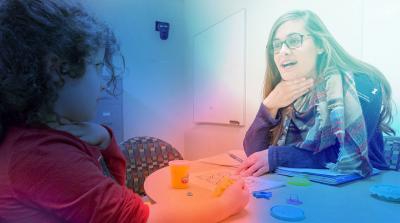Speech & Hearing Science PhD
The Doctor of Philosophy (Ph.D.) in Speech and Hearing Science at the University of Illinois is a research-oriented degree that prepares students for academic research careers in the field of communication sciences and its disorders.
The PhD program is rigorous in terms of expectations but flexible in terms of prerequisites, thereby allowing students to take advantage of the wide variety of courses and research labs available at the university in order to build their own individual expertise. In addition to completing an individualized program of coursework and research experiences, students will develop the necessary skills to review research, develop research questions, design studies, present at conferences, submit papers, and teach courses. Our goal is to prepare visionary leaders in translational research to fill a variety of influential career positions in communication sciences and its disorders, including academic appointments at research-intensive universities, research institutions, public agencies, and clinical research settings.
Program Structure
- Stage 1
Entry into program to Early Research Project
- Stage 2
Early Research Project to Qualifying Examination
- Stage 3
Post Qualifying Exam, Dissertation Preliminary Exam to Dissertation Defense
The first two to four years of the doctoral program are typically devoted to course work, including the completion of an Early Research Project (ERP), in the area of concentration selected by the student. For students entering with a M.A./M.S., the ERP occurs early in Stage II and must be completed before the Qualifying Exam. For students entering the PhD program directly from a B.A./B.S. degree, the ERP may be undertaken and completed in Stage I or Stage II. In the middle of Stage II, students will take a Qualifying Exam. Successful completion of the Qualifying Exam provides evidence of the student's satisfactory progress toward scholarly independence and indicates the student is then qualified to begin the planning stages of a dissertation proposal. A preliminary exam on the dissertation proposal occurs at the end of Stage II and marks the transition to Stage III. The doctoral program culminates with a Final Exam/Dissertation Defense, and oral examination over a written document.
Curriculum
Degree requirements with an approved master's or Au.D. degree
For more information about degree requirements contact the program director or refer to the university catalog.
| Code | Course |
|---|---|
| SHS 590 |
SHS 590 History of Comm Sci & Disorders
Hours: 4 |
| SHS 592 |
SHS 592 Prosem Speech & Hearing Science
Hours: 2-4 |
| SHS 594 |
SHS 594 PhD Early Research Project
Hours: 6-8 |
| SHS 599 |
SHS 599 Thesis Research
Hours: 24 |
|
3 Statistics courses
Hours: 12 |
|
|
1 or 2 advanced 500-level SHS seminars
Hours: 4-8 |
|
|
Restrictive Electives
Hours: 8-12 |
Total Hours: 64
Other Requirements
- Minimum of 96 credit hours beyond a bachelor’s degree or 64 credit hours beyond a master’s degree
- Qualifying Exam Required Yes
- Preliminary Exam Required Yes
- Final Exam/Dissertation Defense Required Yes
- Dissertation Deposit Required Yes
- Minimum GPA: 3.0
Degree Requirements with an approved Bachelor's Degree
For more information about degree requirements contact the program director or refer to the university catalog.
| Code | Course |
|---|---|
| SHS 590 |
SHS 590 History of Comm Sci & Disorders
Hours: 4 |
| SHS 592 |
SHS 592 Prosem Speech & Hearing Science
Hours: 2-4 |
| SHS 594 |
SHS 594 Ph.D. Early Research Project
Hours: 8 |
| SHS 599 |
SHS 599 Thesis Research
Hours: 24 |
|
3 Courses in Statistics or related field
Hours: 12 |
|
|
1 or 2 advanced 500-level SHS Seminars
Hours: 4-8 |
|
|
Restricted Elective Hours
Hours: 40-42 |
Total Hours: 96
Tuition Information
For information on tuition and fee rates, visit the Office of the Registrar’s webpage.
PHD Program Admissions Information
Funding Opportunities
Additional Information
Financial support through the Department, typically research or teaching assistantships, is available for a limited number of students. Assistantships are awarded first to doctoral students and are based on merit and the strategic goals of the Department. For more information on financial aid, need-based financial support may be applied for through the University Financial Aid Office.
Additional information can be found at the links below:
Requirements for PhD in Speech and Hearing Science
Program Structure for PhD in Speech and Hearing Science
Sample Programs of Study for PhD in Speech and Hearing Science
Request more information
- SHS-grad-admissions@ahs.illinois.edu
- 901 South Sixth Street, Room 103
- 217-333-2230

